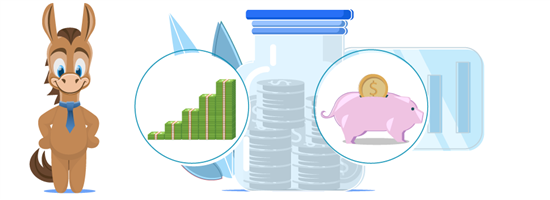Money Market vs Savings
Ad Disclosure: This article contains references to products from our partners. We may receive compensation if you apply or shop through links in our content. This compensation may impact how and where products appear on this site. You help support CreditDonkey by using our links.
Savings and money market accounts are both FDIC insured bank accounts. So what's the difference? Learn the pros and cons and find out which is best for you.
 |
| © CreditDonkey |
- Money Market and Savings Accounts Overview
- Comparison Chart
- What is a Savings Account
- What is a Money Market Account
- Is a Money Market Account Better Than a Savings Account
- Which One is Right For Me
- Best Money Market and Savings Accounts
Money Market and Savings Accounts Overview
Having a savings account is an important part of personal finance management. It's a risk-free place to store your money for things like an emergency fund and short term goals.
When you open a savings account at a bank, you usually have 2 options:
- a traditional savings accounts or
- a money market account (MMA)
They are very similar with some differences in their use. Here are some common features of both :
- Offer interest to help grow your savings
- Limited to 6 withdrawals or transfers per month
- No limit to number of deposits you can make
- FDIC insured (up to $250,000 per depositor per bank)
Now let's take a look at each one in more detail and how they are different.
Comparison Chart
Here's a money market account vs savings comparison chart to understand the main differences:
| Savings Account | Money Market Account | |
|---|---|---|
| Use For | Saving money for emergencies and goals | Saving money, but also freer access to funds |
| Monthly Fees | Varies by bank | Varies by bank |
| Minimum Balance | Varies by bank | May require higher balance |
| Restrictions | Limited to 6 withdrawals per month | Limited to 6 withdrawals per month |
| Interest | Varies by bank | May offer higher interest, but varies |
| Checkwriting | No | Sometimes |
| Bill pay | No | Sometimes |
| ATM/Debit Card | Generally no (but some may offer ATM card) | Sometimes |
| FDIC Insured | Yes | Yes |
What is a Savings Account
 |
| © CreditDonkey |
A savings account is a secure place to park your money and let them grow over time. Unlike a checking account, it's intended as a place to save money you don't need in the immediate future, so you shouldn't be always touching your funds. Some banks will require a minimum balance (or else there's a monthly service charge).
Often, savings accounts offer interest to help your money grow. The rate will vary by each financial institution. Online savings accounts usually give the highest rates.
Since you're supposed to be saving money, you're limited to only 6 withdrawals or transfers each month. If you exceed that amount, a penalty will apply.
A savings account makes a great partner to a checking account. It can be used for overdraft protection in case you accidentally overdraw your checking.
What is a Money Market Account
A money market account is like a hybrid savings and checking account. You're still limited to 6 withdrawals a months, however, you get a little more flexibility and easier access to your money.
A lot of money market accounts allow for checkwriting and online bill pay (which is not allowed in in traditional savings accounts). Some even come with a debit card you can use for purchases and withdrawing money at ATMs. This makes your funds more liquid. You'll have to check what features your MMA offers.
MMAs may offer higher interest rates than savings accounts. However, in exchange, some banks will have bigger account balance and/or minimum deposit requirements. Again, rates and requirements will vary. Check out the best money market rates.
No. A money market account is a bank account. If it's at a bank, it's covered by federal FDIC insurance. And if it's a credit union, it's insured by NCUA. Both insure your funds up to $250,000.
Don't confuse a money market account with a money market fund. Money market funds are invested in securities. Though they're usually low-risk, they're still subjected to market risk, and therefore loss of value. They're also not insured by the FDIC.
Is a Money Market Account Better Than a Savings Account
 |
| © CreditDonkey |
Both are good options for saving money. The right type of account for you depends on what you're looking for and your financial situation.
A money market account offers the best of both worlds with more flexibility and higher interest rates. However, the minimum balance may be higher too. So if you're just starting out to save and can't maintain the required balance, it won't be the best choice for you.
Also because of the freer access to your funds, it makes it all too convenient to spend the money in your account. So if your primary goal is to SAVE money, you may want to remove those temptations by going with a traditional savings account. Instead, choose a high-yield savings account if you want similarly high interest rates.
But remember - both accounts only allow up to 6 withdrawals and transfers per month. Both are not meant to be used as an everyday banking account for your daily needs.
Is a Money Market or Savings Account Right for Me?
A money market account is best if you:
- Have a bigger amount of money to deposit
- Want easier access, like debit cards and checkwriting
- Want better interest rates in exchange for bigger balance
A traditional savings account is best if you:
- Are just starting to save or don't have a lot to deposit
- Are focused on saving money
Hear from an Expert
CreditDonkey asked JP Krahel from Loyola University Maryland for his expert opinion on money market accounts vs savings accounts.
Here's what he had to say:
Best Savings Accounts
CIT Bank Platinum Savings - $300 Bonus
- Transfer a one-time deposit of $50,000+ for a Bonus of $300
- 4.10% APY with a balance of $5,000 or more
- 0.25% APY with a balance of less than $5,000
- No monthly maintenance fee
- Member FDIC
Discover® Online Savings - $200 Cash Bonus
To qualify for Bonus: Apply for your first Discover Online Savings Account, enter Offer Code CY325 at application, deposit into your Account a total of at least $15,000 to earn a $150 Bonus or deposit a total of at least $25,000 to earn a $200 Bonus. Qualifying deposit(s) may consist of multiple deposits and must post to Account within 45 days of account open date. Maximum bonus eligibility is $200.
What to know: Offer not valid for existing or prior Discover savings customers. Eligibility is based on primary account owner. Account must be open when bonus is credited. Bonus will be credited to the account within 60 days of qualifying for the bonus. Bonus is subject to tax reporting. Offer ends 09/11/2025, 11:59 PM ET. Offer may be modified or withdrawn without notice. Due to new customer funding limits, you may wish to initiate fund transfers at your other institution. For information on funding, see FAQs on Discover.com/Bank. See advertiser website for full details.
Best Money Market Accounts
UFB Portfolio Money Market - Earn up to 4.01% APY
- Earn up to 4.01% APY*
- Enjoy no monthly maintenance fees with a $5,000.00 balance, otherwise fee is $10.00 per month.
- Access your funds 24/7 with easy-to-use digital banking tools.
- Have peace of mind with FDIC insurance up to the maximum allowable limit – Certificate #35546.
Money Market Deposit Account - 4.15% APY
- $1 minimum deposit
- No fees
- 24/7 online access to funds
- FDIC insured
Bottom Line
Both money market accounts and savings accounts are excellent—and safe—deposit accounts to save your money.
The main difference between a money market account and savings account is how you access your funds. Some money market accounts offer increased flexibility by allowing for checkwriting or debit card use. They also may have higher interest rates, but may also require higher account minimums.
Remember: Rates and features vary by bank. Take some time to research the best place for your money.
Write to Kevin L at feedback@creditdonkey.com. Follow us on Twitter and Facebook for our latest posts.
Note: This website is made possible through financial relationships with some of the products and services mentioned on this site. We may receive compensation if you shop through links in our content. You do not have to use our links, but you help support CreditDonkey if you do.
|
|
|















